China, a country ill-famed for trying to take advantage of smaller economies in need of money, is now exploiting the security vacuum in Iraq that was created after the United States’ withdrawal from the West Asian country and is aligning with militia groups to gain a strong foothold in the country’s lucrative oil industry, media reports said.
China’s increasing control over oil is now becoming a major cause of concern for Iraq, a resource-rich nation. Beijing has always resorted to using shrewd tactics in order to trap these nations and later cripple them economically and now it is playing out the same tactic in a bid to gain control of the West-Asian nation, reported Washington Post.
Two decades ago, in 2003, the United States’ invasion of Iraq liberated the Iraqi people from the tyrannical rule of Saddam Hussein. Today, Baghdad is witnessing a growing China clout, a perfect example of how Beijing is looking at the security vacuum as an opportune time to dominate Iraq.
Many attempts have been made by China in order to take over Iraq’s dominance over oil and petroleum resources. However, each attempt was foiled by Iraq’s Oil Ministry. Russia’s Lukoil and U.S. oil giant Exxon Mobil wanted to sell their stakes in major fields to Chinese government-backed firms, but Iraq’s Ministry of Oil intervention prevented it.
Even Britain’s BP was contemplating selling a stake to a Chinese company but was dissuaded by Iraqi officials. In a scenario of China succeeding in cracking this deal, it might well have triggered an “exodus” of international oil giants that would leave Iraq open to a more extensive takeover by Beijing, as per the Washington Post.
This growing Chinese expansion in Iraq is worrying as the Iraqi government has voiced deep concerns over China attempting to virtually take over the Middle East nation. Recently, a protest also took place near the headquarters of a Chinese oil company in Iraq’s southeastern governate of Maysan.
This reflects Iraq’s growing concern about China’s expansion into the oil sector. Moreover, even the think tanks are also now articulating about China.
Washington Post quoted Italian think tank Geopolitica and noted that China is exploiting the security vacuum in Iraq that was created after the United States’ withdrawal from the West Asian country, with its companies aligning with militia groups to gain a strong foothold in the Iraqi oil industry.
According to a Financial Times report, cited by the US-based media portal, in 2021 alone, Beijing struck deals worth USD 10.5 billion in Iraq’s construction sector.
Iraq, the third biggest exporter of oil to China, is eager to secure Chinese investments in infrastructural development. That’s because several U.S. and European companies have been reluctant to invest in Iraq due to rampant corruption and militias (reportedly loyal to Iran) targeting U.S. coalition forces and Western interests.
Although China prefers to collaborate with strong and centralized state authorities, it has found ways of dealing with an unstable Iraq. China is becoming ambitious in expanding its influence in various key sectors in Iraq namely connectivity and trade.
Moreover, Washington quoted a recent report from Shanghai’s Fudan University, in 2021, and noted that Beijing secured new construction deals in Iraq worth USD 10.5 billion — constituting almost one-sixth of China’s Belt and Road Initiative investments that year.
For China, Iraq has emerged as the number one trading partner in the region and the third largest oil supplier, right after Saudi Arabia and Russia. Its energy reserves and strategic location — near the Persian Gulf and Strait of Hormuz — prove critical to the BRI.
China’s tightening clutch in Iraq is aimed at not only increasing the economic linkages between the two nations but also to leverage all this and translate it into increasing political influence over a period of time. US withdrawal from Iraq has resulted in a ripple effect in increasing Chinese authority in Iraq.
As per the media portal, three nations — the US, Iran, and Turkey– are keeping a watch on this increasing Chinese muscle in the West Asian region as they remain actively and deeply connected to Iraq.

